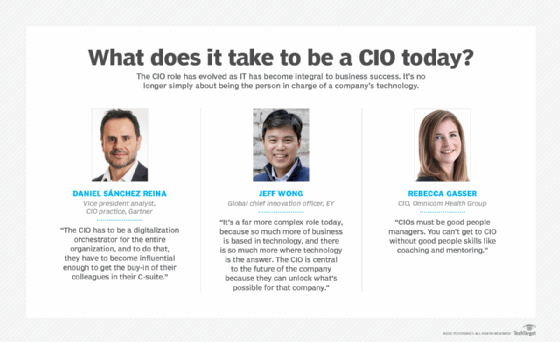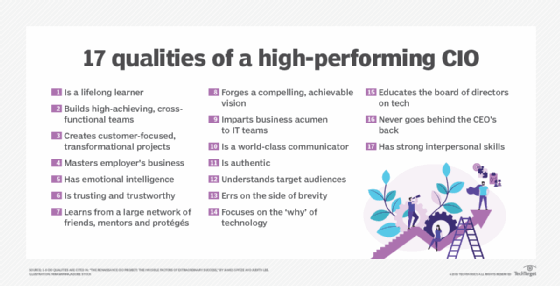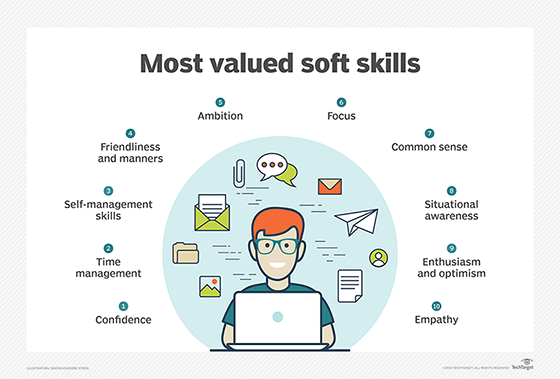CIO career path: How to become a CIO
The career path to becoming a CIO has evolved as the role has become increasingly critical to business success. Find out how to become a CIO and what the job entails.
Rebecca Gasser, CIO at Omnicom Health Group, knew in college that she wanted to be a CIO. She started her career in IT as a senior analyst in desktop certification and desktop engineering. She moved up the tech ranks from there, becoming a desktop application manager and a leader in her company's global project management function. She landed other leadership roles, including director of application support and head of product. Along the way, she earned a master's degree in information systems and a Master of Business Administration.
Believing she needed a broader range of technical, managerial and leadership experiences to continue her ascent, she found a position as a VP of IT, which laid the groundwork for her current position. She was named CIO at Omnicom in 2021, fulfilling a two-decade quest to become a corporate leader.
As CIO, Gasser is the senior authority on information systems within the company. As such, she plays an essential role in shaping how the organization will use technology to advance its objectives. Like all CIOs, she must understand how current and emerging technology capabilities can support and transform the way the company works and how it delivers products and services. Succeeding at this work requires having a complementary mix of technology, business and executive experiences.
Many CIOs gain those requisite experiences by working their way up the proverbial professional ladder within corporate IT departments, following a path that looks much like Gasser's. Others, though, come to the CIO job after working in business functions and entrepreneurship or after holding the chief technology officer (CTO) or another high-level non-IT position.
This article is part of
The evolving CIO role: From IT operator to business strategist
Various pathways to a CIO career are valid, according to the CIOs and experts on corporate leadership roles we interviewed. They agreed there is no one way to get to the CIO post, although there are common expectations on what qualifications candidates must possess to land and succeed in the role.

What is a CIO?
The CIO position is one of the newer C-suite roles: The title dates back at least to the 1980s, although most organizations added the executive-level post in the subsequent decades.
The role has evolved significantly from its earliest days.
The CIO job initially focused on the successful delivery of technology services, with reliability and uptime being the main measures of success. But the CIO post became more strategic as organizations became increasingly reliant on technology to operate and compete. As noted, CIOs are expected to not only understand how current and emerging technology capabilities can support the organization's existing products and services but also how tech can shape its future offerings. As technology is a component of virtually every job in the enterprise, CIOs must also ensure the delivery of reliable and user-friendly IT tools and services.
Leadership qualities and change management skills have become critically important in this job. Executive advisors and management consultants said that successful CIOs must first, have a deep understanding of how technology can transform their organizations and second, be equipped to lead that business transformation.
"In the past, 'executive' was not attached to the CIO role; it was simply the person in charge of technology in the company," said Daniel Sánchez Reina, vice president analyst in the CIO practice at Gartner, a tech research firm. CIOs today care strongly about the company's business objectives and how to achieve them.
"The executive mindset is primary; being the person in charge of technology, that's secondary today," he said.
What does a CIO do?
A typical CIO's list of responsibilities has grown as the role has evolved, according to multiple tech executives and executive advisors.
"It's a far more complex role today, because so much more of business is based in technology, and there is so much more where technology is the answer," said Jeff Wong, global chief innovation officer with professional services firm EY.
Rick Harris, managing director at the executive search firm Raines International, who conducts searches for technology executive positions and their direct reports, said CIO responsibilities vary from one organization to the next, but in general the organization's top IT executive does the following:
- oversees technology components provided by dozens, even hundreds, of vendors, including those that run on premises in their own data centers or, increasingly, off-site in hosted servers as part of cloud computing;
- orchestrates a technology stack that includes hardware and software selected, purchased and maintained by their own IT department as well as technologies selected and deployed by citizen developers and individual business units;
- collaborates with executives within their organization to craft short-term, mid-term and long-term business strategies;
- advises leadership on how current and emerging technology can support objectives and create new opportunities for cutting costs, improving productivity and increasing revenue as well as introducing new products or services;
- builds a qualified management structure and team of IT professionals, determining the appropriate mix of staff members, contract workers, vendors and other external partners;
- creates a workplace culture that fosters the speed, flexibility, employee development, innovation and retention required to compete in today's digital age;
- implements appropriate standards, controls and practices, such as DevOps and Agile development principles that help meet CEO and board's objectives; and
- handles all these responsibilities within established budgets.
Harris noted that the type and scope of work will vary by enterprise size: CIOs at larger companies are focused more on setting policies and managing the directors who oversee the teams carrying out the work; CIOs at small and even some midsize organizations are more likely to have more direct involvement in the day-to-day work of running the IT department.

Why are CIOs important to organizations?
As the CIO's role and its list of responsibilities has evolved so has the CIO's importance within an organization.
"The CIO is central to the future of the company because they can unlock what's possible for that company," Wong said.
McKinsey & Co. noted in its 2021 CIO report that the importance of CIOs has increased because "businesses' top goals are unreachable without technology."
IBM's 2021 CIO study, "The CIO Revolution: Breaking barriers, creating value," which queried 3,000 CEOs on which C-suite executives were most critical to their organizational success, found that CEOs consistently listed CIOs and CTOs jointly in the top three. "Among CEOs at top-performing organizations, technology leaders were second only to CFOs," the report stated.
On IT's role during the COVID-19 pandemic, 77% of the CIO respondents said that their teams "played a vital role in their organizations' response to the pandemic."
Contrast that with IBM's figures from 2011, when "only 1 in 5 CIOs ranked themselves as a critical enabler of business/organization vision."
To enable a business vision, however, Gartner's Sánchez Reina stressed that CIOs must be able to broadly communicate the value of their technology approach.
"The CIO has to be a digitalization orchestrator for the entire organization, and to do that, they have to become influential enough to get the buy-in of their colleagues in their C-suite," he said. "The CIO of the past didn't do this; they were constrained by the walls of the IT organization."
What skills and qualifications are needed to become a CIO?
According to Gartner's "2021 Evolution of CIO Responsibilities Survey," CIOs "increasingly work on enterprise-level initiatives beyond their traditional IT delivery executive roles;" 83% of responding CIOs told Gartner they have "contributed significantly to enterprise executive initiatives." Moreover, CIOs reported that they expected to continue to contribute to the transformation of key business processes and business capabilities, the hybrid workplace, new ways of working and business strategy development in the year ahead.
In the Gartner report, "Critical Skill Sets That CIOs Need to Succeed in 2022," attributes cited by CIOs as being crucial to their success included the following:
- ability to influence stakeholders
- capable communicator
- savvy negotiator
- possessing business acumen and financial management skills
Gartner's Sánchez Reina also cites the ability to manage and mitigate risk as a key skill.

How to become a CIO: Education, training, experience
Executive advisors, recruiters and CIOs themselves agreed that aspiring CIOs can gain the skills they need through a mix of education, training and experience.
Omnicom's Gasser is an example of this mix. Gasser said her job experience at pharmaceutical firm GSK and then at facility maintenance company Ferrandino & Son made her a well-rounded technologist. Education and training were also important. In addition to her bachelor's degree in business management and her master's degrees, Gasser got training in management and project management skills such as Six Sigma and Scrum development. She also worked with coaches and business partners to develop leadership skills and interpersonal skills.
"CIOs must be good people managers. You can't get to CIO without good people skills like coaching and mentoring," she said.
Gasser said this complementary mix of skills and experience is essential for CIOs today as they must be collaborative strategists rather than "command-and-control" leaders. It goes without saying that CIOs must be skilled in speaking the language of the business, she added. They must understand how their organizations operate and make money, have insights into their organization's industry and demonstrate visionary capabilities to succeed.
Wong had a similar list of business and communications skills. "I'd still look for a technical depth -- either experience or a degree, significant experience with emerging tech, which in today's world means AI and blockchain, and an ability to continuously grow their knowledge in that area," he said.
Climbing the career ladder. Early-generation CIOs came almost exclusively from the IT ranks. They generally worked their way up from entry-level positions on the help desk or in programming through analyst, manager and director positions, experts said.
In contrast, aspiring CIOs now have multiple pathways to the position.
Sánchez Reina said Gartner research has shown that about a third of CIO positions now are filled by professionals without IT backgrounds, a reflection of the role's business-oriented focus as well as the growth of technology acumen among workers overall.
"It also shows that the executive element of the CIO role is more important today than it was in the past," he added.
What is the average salary of a CIO?
According to career site Zippia, CIOs earn an average annual salary of $131,740, with the average starting salary for CIOs coming in at $84,000. Its analysis also found that the top 10% of highest-paid CIOs earn $200,000 or more.
Meanwhile, career site PayScale put the average base salary for CIOs at $168,680.
Salary.com's figures were higher, saying that the median chief information technology officer salary in the U.S. is $293,562 as of April 2022.








